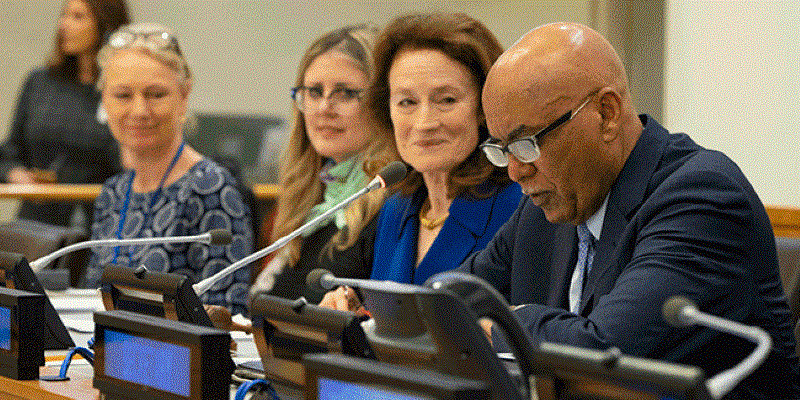Thank you Mr. President,
I deliver this statement on behalf of Australia, Austria, Canada, Denmark, Finland, France, Germany, Iceland, Israel, the Republic of Korea, Luxembourg, the Netherlands, Slovakia, Sweden, Turkey, UK, the United States and my own country Norway.
Let me start by thanking the presenters of UNICEFs financial report and audited statements for the year ended 31 December 2017 and the Report of the Board of Auditors. We commend UNICEF for once again having received an unqualified audit. Last year, we asked for a management response to the report, and we commend UNICEF for providing a comprehensive response.
As pointed out last year, a detailed management response provides UNICEF with an opportunity to showcase its success in implementing audit recommendations. UNICEF has indeed made good progress, and thereby addressed identified organizational weaknesses . UNICEF is urged to address remaining recommendations, especially in areas where they are recursive.
We would encourage UNICEF to address the organizational weaknesses identified in the audit reports, internal audit reports and in the investigations of cases of misuse of funds in a comprehensive manner. It should prioritize follow up based on an assessment of which weaknesses pose the greatest risks to results achievement. Mismanagement of funds by implementing partners, for example, is a significant risk for an organization that channels 35% of its budget to more than 9000 partners. It is therefore vital that UNICEF continuously improves the implementation of relevant policies and procedures in the field.
The Board of Auditors has again pointed to inadequate implementation of guidelines for Harmonized Approach to Cash Transfers - HACT. We urge UNICEF to take active steps towards their full implementation and to strengthen monitoring mechanisms at HQ level. In its management response, UNICEF states that the recommendation to “review and strengthen the internal control and monitoring system for cash transfers to implementing partners and fully adhere to the established policy for these cash transfers” has been implemented, but it is not clear to us whether issuing a new procedure fully answers this recommendation. We kindly ask UNICEF to provide member states with more information on the revised procedures on HACT and how they will strengthen the internal control and monitoring system.
Mr. President,
20 cases of fraud or presumptive fraud were reported, compared to 35 in the previous year. The number seems to be low for an organization of UNICEF´s size. An increase of reported cases would be a sign of functioning routines for detecting and reporting suspicions of fraud.
UNICEF has made progress in recovering funds lost due to fraud perpetrated by staff members. However, less progress has been made on cases of fraud by implementing partners. We ask more information on why this is the case and on what steps UNICEF is taking to increase the overall percentage of recovery.
We note that the Board of Auditors has made several comments relating to the Virtual Integrated System of Information – Vision. Three out of seven main recommendations relate to travel management. We encourage UNICEF to further develop Vision and related policies and guidelines.
We also note that the Board of Auditors points to a continued need for engagement with National Committees to bring retention levels down and contribution rates up, and that they ask for explanations of differences between budgeted and actual amounts in financial statements.
We encourage UNICEF to ensure that the requisite approval processes are consistently followed when re-engaging former UNICEF staff members as consultants.
We are concerned by the Board of Auditors’ observation on investments made in lower rated counterparties, support its’ recommendation and urge UNICEF to adhere to established financial rules and regulations. Delays in the claiming of VAT refunds by Country Offices is another area of concern, and we hope to see a decrease in this amount in the next Board of Auditors report.
Thank you.
